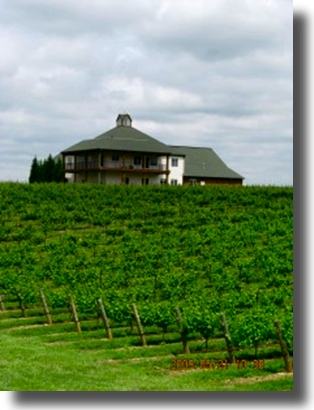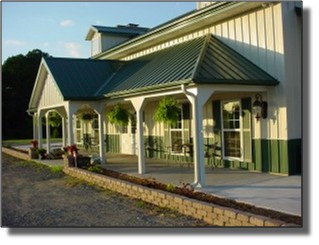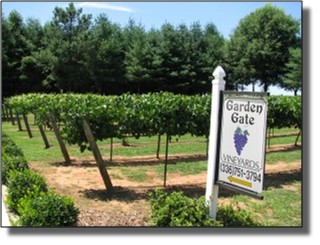Enjoy Award Winning Wines From 5 Davie County Vineyards!
Davie County is home to five wonderful vineyards with a variety of award winning wines available to suit any taste. Fall and winter are a wonderful time to discover new wine pairings for your favorite holiday recipes, enjoy a glass of wine with family and friends, and take part in a variety of scheduled events. Event schedules for each vineyard are available on the vineyard web sites. Davie County Vineyards are welcoming spots to enjoy with a group of friends and family for an hour, an afternoon or an entire evening.
 RayLen Vineyards & Winery
RayLen Vineyards & Winery
3577 Highway 158 Mocksville, NC 27028 (336) 998-3100 www.raylenvineyards.com. Open Monday-Saturday 11:00 AM-6:00 PM, Sunday 12:00-5:00 PM
Raylen offers 16 award winning wines. Their white wines include Pinot Grigio, Viognier, Riesling, multiple Chardonnays and Yadkin Gold, a unique blend of their whites. Their red wines include Shiraz, Merlot, Cabernet Franc, Cabernet Sauvignon, and a number of blends.
Raylen’s tastings are divided into “flights,” which are a selection of wines. The white and red flights are $6 each or you may taste a complete flight for $10.
The first vines for RayLen Vineyards & Winery were planted in 1999 when Joe and Joyce Neely purchased the property. Until then, the property had functioned as a dairy farm for nearly a century. Today, the rolling hills and winding drive romance our guests as they drive through 35,000 European varietal grape vines. The distinctive cupola roof top of RayLen Vineyards & Winery is a beacon for the southern portion of the Yadkin Valley Appellation. Travelers from the highway and wanderers from the surrounding country roads are drawn to the Tasting Room to discover a new experience. Loyal customers return for the lush vista and a reliable favorite of RayLen’s award-winning wines. Vintner Steve Shepard has a long history in winemaking. His education and career began in Pennsylvania; since 1980, Shepard has been making wine commercially. Drawn south, Shepard’s North Carolina career began in 1989 at the first Yadkin Valley winery. The Yadkin Valley’s unique microclimate and soils have proven to be optimal for growing European varietals. From the date of RayLen’s purchase, Shepard helped design the vineyard for optimum growth for the 10 different European varietals grown. In its first three vintages, RayLen Vineyards & Winery won over 200 medals at various statewide, regional, and international competitions. Shepard has been recognized by Robert Parker for his 1991 vintage wines, while RayLen has been lauded by the Wine Spectator as one of the premier wineries in the Southeast.
 Misty Creek Farm and Vineyards
Misty Creek Farm and Vineyards
710 Wyo Road Mocksville, North Carolina 27028 (336) 998-3303 www.mistycreekwines.com. Open Friday: 4:00-8:00 PM, Saturday: 10:00 AM-8:00, PM Sunday: 2:00-6:00 PM.
Misty Creek has 14 acres of vineyards, and their award-winning wines include Chardonnay, Traminette, Cabernet Sauvignon, Merlot, Syrah, and Chambourcin. They also offer a variety of sweet wines including, Misty Rose, Chamberry, Rhapsody in Blueberry, and Blackberry Cobbler, all made with real sugar and real fruit extracts. A wine tasting is $10, and includes all 11 wines as well as the wine glass.
Misty Creek’s vineyards and tasting room lie between the communities of Huntsville and Farmington near the Shallow Ford of the Yadkin River, an area used for centuries by Native Americans as a meeting ground and natural fish trap. Later the Shallow Ford served as a safe place for travelers, wagons and stagecoaches to cross the Yadkin River on the Great Wagon Road (known locally as the Colonial Pike) from Philadelphia to Augusta, Georgia.
A thriving community developed at the ford to serve passing wagon trains, and the deep cut of the Great Wagon Road is still evident today on both sides of the Yadkin River. By 1770, a road cut from this area to Mulberry Fields (near Wilkesboro) later became known as the Daniel Boone Trail, named after Daniel Boone who married and built a cabin on the Sugar Creek, approximately two miles east of Farmington, in 1756.
On October 14th, 1780 during the American Revolution a large group of Tories crossed the Shallow Ford to be defeated by Whig forces. Fourteen Tories were buried in a small plot west of the crossing, and almost immediately the brash colonials built a pig lot over their final resting place to commemorate forever this event. Later in 1781 Lord Cornwallis crossed the Shallow Ford in pursuit of General Nathaniel Green’s “Green Mountain Boys”, the two forces meeting at the Battle of Guilford Courthouse in Greensboro.
After the war in 1792, Charles Hunt purchased 250 acres and began to lay out 111 half-acre lots to establish the city of Huntsville. Local history suggests that Huntsville narrowly missed being the state capital for North Carolina. In April 1865 Union General George Stoneman’s cavalry crossed the Shallow Ford and routed the Confederacy’s Yadkin Home Guard, subsequently ransacking the town of Bethania and looting the town of Huntsville as one of the last acts of the Civil War.
The Nichols family purchased this land in early 2001, naming it Misty Creek after the natural spring that bisects the property. They immediately began a series of improvements that included a lake, roads and irrigation, and planted the first four acres of Merlot, Cabernet Sauvignon, Chardonnay and Chambourcin. The following year an additional 10 acres were planted, and Syrah was added to the vineyard. Finished in June 2009, the tasting room sits directly on the site of a pioneer cabin originally built in 1800 as a mule barn, and overlooks the old road bed. The deep well and original entry road are very evident in the topography, and they continue to find hand-made bricks, pottery shards, spear points and other evidence of long habitation. Misty Creek Vineyards are located in Davie County, named for William R. Davie who was a revolutionary war leader, minister to France and later governor of North Carolina.
 Garden Gate Vineyards
Garden Gate Vineyards
261 Scenic Drive Mocksville, NC 27028 (336) 751-3794 or (336) 941-7721 www.gardengatevineyards.net. Open Wednesday through Saturday 12:00-5:00 PM, and Sunday by appointment.
Garden Gate Vineyards, owned by Bob and Sonya Whitaker offers free tastings of their home-style muscadine and fruit wines including Scuppernog, Muscadine, Blackberry, Blueberry, Strawberry and other varieties including Sangria and “Jitter Bug.” The Whitakers do all of the blending and bottling themselves. They have had visitors from all 50 states and 11 foreign countries. Garden Gate uses no pesticides on their grapes, relying instead on the large number of resident blue birds lured to their countryside setting. In addition to the wines, Garden Gate also offers a fine selection of hand-made pottery created by the hosts.
 Lazy Elm Vineyards
Lazy Elm Vineyards
523 Danner Road Mocksville, NC 27028- (336)909-4914 www.lazyelm.com. Open Saturday 12:00-8:00 PMish, Sunday 12:00-6:00 PMish, and Monday-Friday by appointment.
Lazy Elm Vineyards offers nine varieties carefully crafted by owner/winemaker/tasting room manager Chris Bolcato. They include Cabernet Sauvignon, Cabernet Franc, Merlot, Dry Rose’, Chardonnay, and Sweet Apple Wines. Unique offerings include Pinot Grigio Arancione (orange wine) a style most commonly used in Italy; Selfish, a port-style dessert wine, and “Damn Yankee” a red blend so named by Bolcato to poke fun at his status as a New Jersey transplant.
Visitors to Lazy Elm are treated to a “behind the scenes” look at the wine barrels and tanks while tasting the wonderful wines. For $7 you may sample all 9 wines and keep your glass as a souvenir.
Chris Bolcato saw his dreams come true in the fall of 2013 when he opened the doors of his winery, Lazy Elm, on a beautiful 43 acre farm in Davie County. His grandfather made homemade wine, so owning a winery is part dream and part family legacy. Lazy Elm currently has 5.5 acres planted in Vitis Vinifera (European Wine style) grapes. Varietals include Montepulciano, Petit Verdot, Mourvedre, Malbec, and Vermentino.
 Chestnut Trail Vineyard
Chestnut Trail Vineyard
640 Cedar Grove Church Road, Mocksville, NC 27028. (336) 655-4755. http://www.chestnuttrail.com: Friday 2:00-5:00 PM, Saturday 1:00-5:00 PM, or call for an appointment. Chesnut Trail currently offers three muscadine wines, including two reds, and a white, but plans to soon add a blush. All their wine comes from grapes grown organically in their vineyard. Tastings are $5, which includes a souvenir glass.
The vineyard began as the retirement project of John and Claudia Ellis, a movie studio musician/oboe teacher and a Peruvian Paso horse enthusiast. Now it’s a family operation with two of their six children and their spouses joining them in their venture, along with many other family members’ support.
The vineyard opened in January 2015 and overlooks 50 acres of rolling hills and horses grazing in the pasture. These horses are the inspiration for the names of the wines, Primor, Legado, and Estrellita.
 A Brief History of Viticulture in North Carolina
A Brief History of Viticulture in North Carolina
Sir Walter Raleigh had no idea that the vine his sailors stumbled upon when they reached the Outer Banks would be so beneficial to North Carolinians. His men reported that the coast was “so full of grapes as the very beating and surge of the sea overflowed them.” Perhaps what his mates spotted was the MotherVine on Roanoke Island, still growing and producing scuppernong grapes since explorers first sighted it in 1584. The vine has a trunk two-feet-thick, and its tendrils stretch along wooden arbors that support their tremendous weight across almost an acre of land. The scuppernong is a type of muscadine grape.
In the early 1800s, Thomas Jefferson noted North Carolina taking the lead with wine culture, estimating its “wine would be distinguished on the best tables in Europe, for its fine aroma, and chrystalline transparence.” The 1840 Federal Census listed the state as the number one wine producer in the U.S.; it remained one of the highest-ranked until Prohibition in the early 1900s. Today, the state’s industry is enjoying a vigorous resurgence, shared this time with the imported European-style vinifera.
Facts about North Carolina Wines
North Carolina is home to more than 160 wineries. The number of wineries has more than quadrupled since 2001. The industry has two focuses – native muscadine grapes and European-style vinifera grapes.
- Commonly planted vinifera grape varieties include Cabernet Sauvignon, Cabernet Franc, Merlot, Syrah, Chardonnay and Viognier. They are planted in the Western and Piedmont regions of the state.
- Plantings of native muscadine grapes, also known as Scuppernongs, are relatively pest resistant and thrive in the hot sandy conditions of the Coastal region. Muscadines contain high levels of Resveratrol and other health-enhancing antioxidants. Some wineries even sell grape skins to nutraceutical companies.
- Scuppernong is the first grape cultivated in the United States and is the official fruit of North Carolina. The MotherVine in Manteo on Roanoke Island, North Carolina is a 400-year old Scuppernong vine and is the oldest known cultivated grapevine in the nation.
- North Carolina ranks 10th in the nation for grape and wine production and third for wine tourism. States.
- More than 400 individually owned grape vineyards are spread across the state, covering 1,800 acres.
- According to a recent study, the annual economic impact of the North Carolina wine and grape industry is $1.28 billion with nearly 7,600 jobs supported.
- The Yadkin Valley is North Carolina’s first federally recognized American Viticultural Area (AVA). It is located in northwestern North Carolina, and there are currently more than 20 wineries and 400 acres devoted to vineyards in the Yadkin Valley.
- Asheville is home to the Biltmore Estate Winery, which receives more than one million visitors annually and is the most visited winery in the United States.
- Medoc Vineyard in the town of Brinkleyville in Halifax County was the first commercial winery established in North Carolina and led the country’s wine production in 1835.
- At the turn of the century, 25 wineries operated in North Carolina, making it one of the most productive wine states in the U.S. The industry closed with the onset of Prohibition.
- A 2007 national survey sponsored by the Travel Industry Association (TIA) in partnership with Gourmet magazine and the International Culinary Tourism Association (ICTA), cited North Carolina as one of the top five state destinations for wine and culinary tourism activities in the United States.
- Duplin Winery, the largest and oldest winery in the state, is the world’s largest producer of Muscadine wine.
[The introduction and facts above are from www.visitncwines.com – Used with permission]